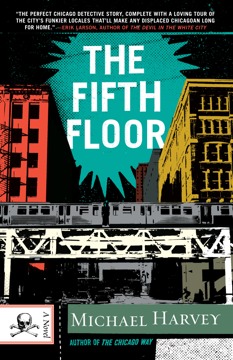Michael Harvey, The Fifth Floor
reviewed by Danielle L. Parker

The Fifth Floor Publisher: Vintage Crime/Black Lizard, 2008 Length: 273 pages ISBN: 978-0-307-38629-8 |
Let’s start off by defining noir. The Literary Encyclopedia (Lee Horsley, University of Lancaster) lists four points in its definition: “(i) the subjective point of view; (ii) the shifting roles of the protagonist; (iii) the ill-fated relationship between the protagonist and society (generating the themes of alienation and entrapment); and (iv) the ways in which noir functions as a socio-political critique.”
None of those points are wrong, but there’s more. First of all, this is one genre where the man in the gray hat — no one’s wearing a white one — doesn’t always win the day. The whole story may be from the viewpoint of the bad guys. It’s a given that many noir stories don’t have happy endings. Right doesn’t really triumph in this shadow world (which is why Mr. Harvey’s book is a stronger flavor of noir than mine).
So of course, we have the classic noir protagonist, the private detective who used to be a cop before his badge was stripped off (exactly like Ross MacDonald’s Lew Archer). Chicago, seedy home of gray, is the classic setting. Chicago politics, seedy shade of darker gray, are classic fodder. Home, sweet noir!
Michael Kelly (name sounds a lot like the author’s, doesn’t it?) is the P. I. He’s been hired by the woman he had a long-ago torrid affair with, including an unplanned pregnancy. Her current (she’s had a few) husband is beating the pulp out of her. Or at least it looks like that. Even her daughter comes begging Kelly to kill Bad Old Dad.
But the ex-lover won’t let her hired knight actually do anything about the abusive husband. Kelly starts poking around the husband anyway, which leads him to a murder scene. The victim’s an unlikely one: an old man with a book collection.
One old tome is missing, and Kelly’s off on the hunt. So, why does an old book about Chicago’s infamous fire have the mayor fired up enough to haul out the grainy photos and manila folders to lay on the blackmail? Who framed Kelly for murder, and who shot the rotten wife-beater?
We’ve got a lot of villains, in the usual noir fashion, and a very noir ending, in which some of the baddies get away, and some get justice, though not in the law-and-order courtroom tradition.
But it’s a sort of happy ending. The P. I. even hooks up with a woman. And what a not-so-noir courtship that is! Philip Marlowe was a heart-bitten misogynist; Sam Spade a cynic who could still admire a tough dame; Lew Archer quick to bed and kiss goodbye his willing females. Michael Kelly is just supine. Do something, Mr. Harvey, with this passive noodle. Or is the woman making all the moves and the man limply following the path of least resistance the modern way to courtship? I’m so out of practice.
I’ve got to say something about the writing in this story, since prose-as-Art is what the best noir novels are famous for. Hammett’s writing defined the attitude. Ross MacDonald described place and setting so vividly you see, taste and smell every moment. Raymond Chandler took us inside the Gray Knight’s ambiguous psyche. Those are the gold standards, of course (though I confess the author I have the most affection for is John D. MacDonald and his battered boat-bum, Travis McGee).
Mr. Harvey does okay. I didn’t turn the pages for the joy of the prose, but his journalistic training shows in that it’s at least clean. He tried with the setting too — we get a tour of Chicago sleazy eateries — but I just wasn’t tasting the hamburgers. What was the most convincing? All the profanity used by the politicians. Nailed that one.
Still, I’ll check out the rest in the series. I’m still looking for great noir, but good noir is good enough.
Copyright © 2009 by Danielle L. Parker

